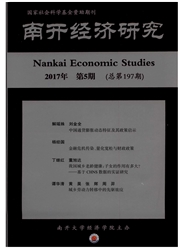

 中文摘要:
中文摘要:
按照预防性储蓄理论,城镇居民医疗保险制度改革可以降低未来医疗支出的不确定性,那么在当前国民收入条件下,预期可以产生大幅度的文化消费增长。但是,这次改革的政策目标决定了参保过程必然存在逆向选择问题,所以考虑到居民消费所具有的层次特征,实际文化消费增长可能很难达到理论预期。基于CFPS数据,使用DID、DDPSM和IV方法,这种对逆向选择问题和消费的层次特征进而对文化消费效应的判断,基本可以得到事实验证。因此,为了提高城镇居民医疗保障水平,扩大医疗保险基金的支付范围,以及推进城镇居民医疗保险和新型农村合作医疗保险的一体化,都预期不会带来较大的文化消费增长。不过,针对高收入健康城镇家庭的实证研究也表明,随着国民健康和收入水平的提高,此类社会保障制度改革的文化消费效应终将逐步得以体现。
 英文摘要:
英文摘要:
The reform on urban resident basic medical insurance system (URBMIS), a measure to reduce urban households' uncertainty of future medical expenditures, is expected to bring substantial growth in cultural consumption. However, considering inevitable adverse selection caused by goal of reform and the hierarchy of consumption, growth in cultural consumption may not come up to theoretical expectation. Using DID, DDPSM and IV estimator, empirical study based on the CFPS supports the above point. The measures taken to upgrade medical insurance level for urban resident, such as expanding the scope of payment and integrating URBMIS and NRCMS, will not contribute to large growth in cultural consumption. Nonetheless,~ the empiri- cal study of high-income and healthy household shows that the effect of social medical security system reform on culture consumption will be achieved gradually.
 同期刊论文项目
同期刊论文项目
 同项目期刊论文
同项目期刊论文
 期刊信息
期刊信息
